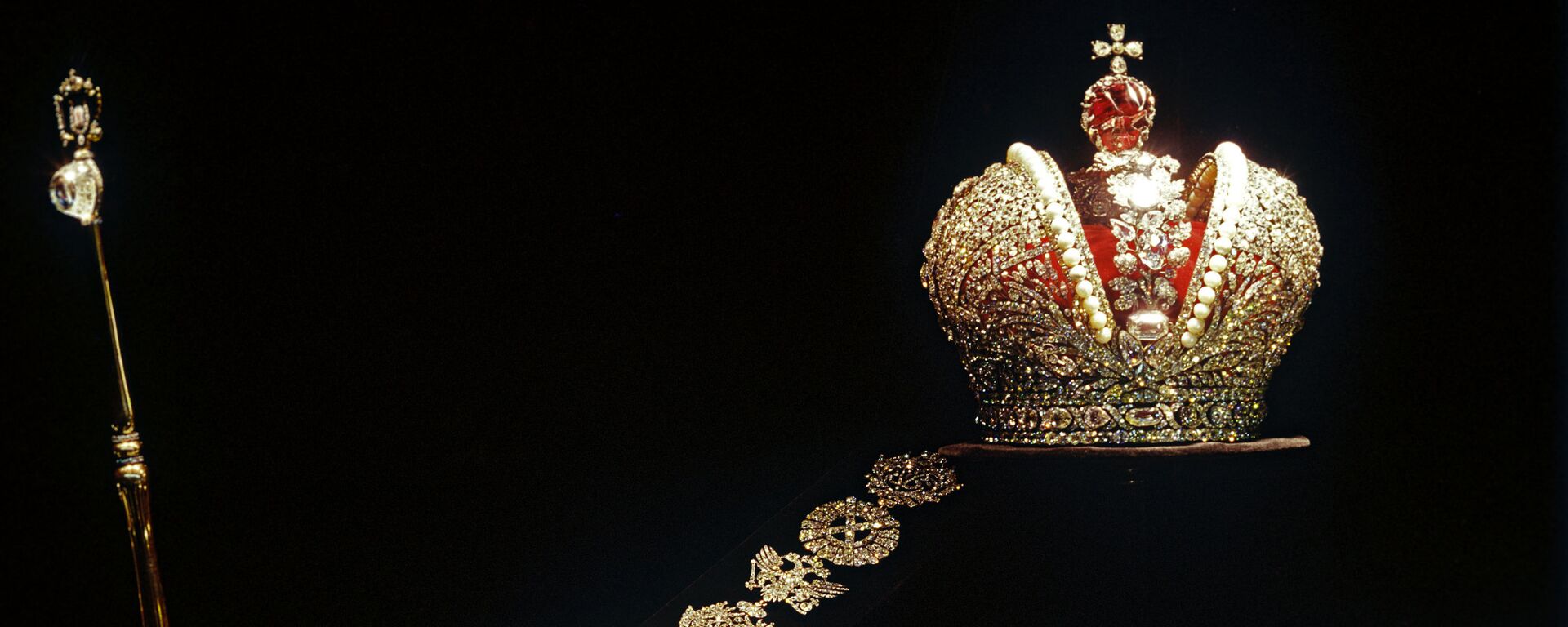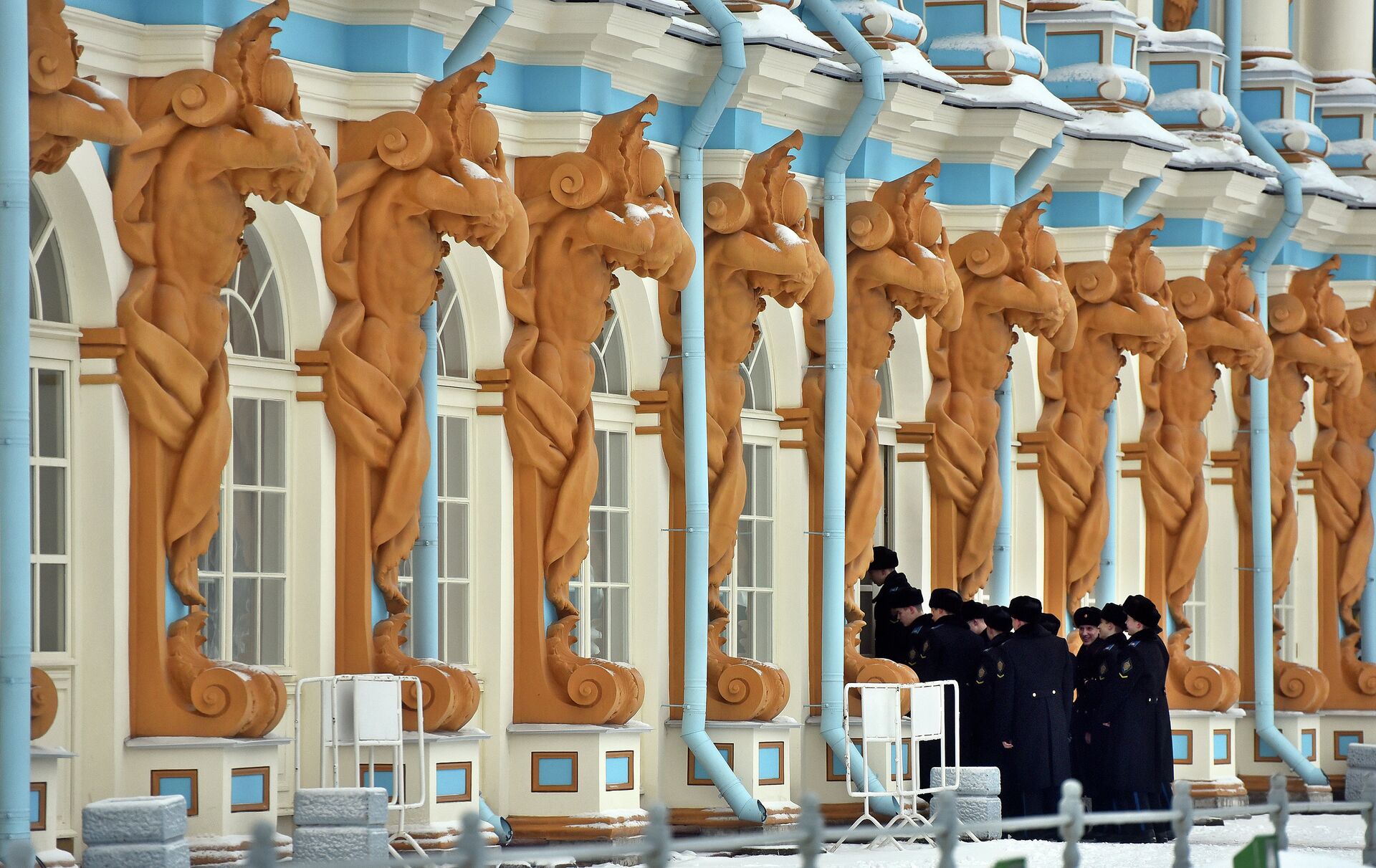https://sputnikglobe.com/20231101/all-russian-scientific-conference-xxvi-yelisavetino-sergiev-readings-scheduled-in-moscow-1114618512.html
All-Russian Scientific Conference XXVI Yelisavetino-Sergiev Readings Scheduled in Moscow
All-Russian Scientific Conference XXVI Yelisavetino-Sergiev Readings Scheduled in Moscow
Sputnik International
The All-Russian Scientific Conference, the XXVI Yelisavetino-Sergiev Readings, is titled "Professional Education under the Patronage of the Imperial House of Romanov: XIX-beginning of XX centuries."
2023-11-01T09:00+0000
2023-11-01T09:00+0000
2023-11-01T09:00+0000
russia
russian academy of sciences (ras)
nicholas ii
romanov family
beyond politics
https://cdn1.img.sputnikglobe.com/img/07e7/0a/1f/1114618640_0:0:2976:1674_1920x0_80_0_0_edefc578c05ccca9499593fc4b9ed52b.jpg
The conference, scheduled for November 1, 2023, will be held at the P.I. Tchaikovsky Moscow State Conservatory. This event commemorates the Year of the Teacher and Mentor, as well as the 155th anniversary of Emperor Nicholas II's birth and the 105th anniversary of the tragic death of the Holy Martyr Grand Duchess Elisabeth Feodorovna.The event will be held on the occasion of the 159th birthday of Grand Duchess Elizabeth Feodorovna. In preparation for the conference, the participants will pay tribute to the memory of the saint by offering prayers in the Cathedral of the Protection, located within the Mariinsky Convent of Mercy. The conference is organized by the Yelisavetino-Sergiev Enlightenment Society and the Institute of Universal History of the Russian Academy of Sciences.Among the prominent speakers at the conference were Alexander Gorbenko, Deputy Mayor of Moscow for Regional Security and Information Policy; Archpriest Dmitry Roshchin, Head of the Department for Relations with Public Organizations of the Synodal Department for Church-Society and Media Relations; Mikhail Lipkin, Director of the Institute of World History; Alexander Sokolov, Acting Rector of the Tchaikovsky Moscow State Conservatory; Larisa Rogovaya, Director of the State Archive of the Russian Federation, and others.The conference will feature leading experts - historians, archivists - from Moscow, St. Petersburg, Kaliningrad, Yekaterinburg, and Vologda. The presentations will delve into the Romanov dynasty's support for a wide array of secondary and higher professional educational institutions.Every year, the Yelisavetino-Sergiev Readings take place in locations linked to philanthropy and education. The Romanov Imperial House consistently prioritized the well-being of the state, ensuring that children, youth, and adults received proper education, and professional development. Professional education was a key focus of the representatives of the Imperial House in their state and public activities. Empress Maria Feodorovna, the wife of Emperor Paul I and the visionary founder of Russia's largest charitable department, the Empress Maria Department of Institutions, showed exceptional care in fostering this growth.From the 19th century until 1917, various departments and societies with support of the Romanov Imperial House, such as the Department of Empress Maria's Institutions, the Imperial Philanthropic Society, the Imperial Women's Patriotic Society, the Russian Red Cross Society, embraced cutting-edge scientific advancements and modern methods in their educational institutions.Empress Maria Alexandrovna, the wife of Emperor Alexander II, greatly contributed to the advancement of women's professional education in Russia. Numerous institutions were established exclusively for women, offering a diverse range of technical, agricultural, medical, artistic, musical, and commercial programs, as well as theological academies and advanced courses.During the reign of Emperor Alexander III, in the midst of rapid industrial development in the country, primary and secondary industrial and craft educational institutions were opened throughout Russia to provide industrial production with adequately trained specialists. Alexander III displayed unwavering support for the advancement of secondary vocational education, dedicating both state and personal resources to the establishment of trade schools. Thanks to his efforts, a series of laws were enacted in 1888 to support the development of industrial schools. Under the rule of Emperor Nicholas II from 1894 to 1917, Russia's economic development continued to grow rapidly. In the early 20th century, a collaboration between the government and private entities led to the establishment of a comprehensive system of vocational-technical educational institutions. By 1914, Russia had 114 state and private institutions of higher education of various vocational orientations, with over 122,000 students.
https://sputnikglobe.com/20180718/romanov-descendant-royal-family-1066472405.html
russia
Sputnik International
feedback@sputniknews.com
+74956456601
MIA „Rossiya Segodnya“
2023
Sputnik International
feedback@sputniknews.com
+74956456601
MIA „Rossiya Segodnya“
News
en_EN
Sputnik International
feedback@sputniknews.com
+74956456601
MIA „Rossiya Segodnya“
Sputnik International
feedback@sputniknews.com
+74956456601
MIA „Rossiya Segodnya“
russian tsar, romanov family, russian empire, nicolas ii, nicolas 2, nicolai 2, nicolai ii, russian royals, russian royal family, russian emperor, russian tsars, russian emperors, imperial house of romanov, romanov imperial house
russian tsar, romanov family, russian empire, nicolas ii, nicolas 2, nicolai 2, nicolai ii, russian royals, russian royal family, russian emperor, russian tsars, russian emperors, imperial house of romanov, romanov imperial house
All-Russian Scientific Conference XXVI Yelisavetino-Sergiev Readings Scheduled in Moscow
The All-Russian Scientific Conference, the XXVI Yelisavetino-Sergiev Lectures, will be held under the title 'Professional education under the patronage of the Imperial House of Romanov: XIX - early XX century'.
The conference, scheduled for November 1, 2023, will be held at the P.I. Tchaikovsky Moscow State Conservatory. This event commemorates the Year of the Teacher and Mentor, as well as the 155th anniversary of Emperor Nicholas II's birth and the 105th anniversary of the tragic death of the Holy Martyr Grand Duchess Elisabeth Feodorovna.
The event will be held on the occasion of the 159th birthday of Grand Duchess Elizabeth Feodorovna. In preparation for the conference, the participants will pay tribute to the memory of the saint by offering prayers in the Cathedral of the Protection, located within the Mariinsky Convent of Mercy. The conference is organized by the Yelisavetino-Sergiev Enlightenment Society and the Institute of Universal History of the Russian Academy of Sciences.
Among the prominent speakers at the conference were Alexander Gorbenko, Deputy Mayor of Moscow for Regional Security and Information Policy; Archpriest Dmitry Roshchin, Head of the Department for Relations with Public Organizations of the Synodal Department for Church-Society and Media Relations; Mikhail Lipkin, Director of the Institute of World History; Alexander Sokolov, Acting Rector of the Tchaikovsky Moscow State Conservatory; Larisa Rogovaya, Director of the State Archive of the Russian Federation, and others.
The conference will feature leading experts - historians, archivists - from Moscow, St. Petersburg, Kaliningrad, Yekaterinburg, and Vologda. The presentations will delve into the Romanov dynasty's support for a wide array of secondary and higher professional educational institutions.
Every year, the Yelisavetino-Sergiev Readings take place in locations linked to philanthropy and education.
The Romanov Imperial House consistently prioritized the well-being of the state, ensuring that children, youth, and adults received proper education, and professional development. Professional education was a key focus of the representatives of the Imperial House in their state and public activities. Empress Maria Feodorovna, the wife of Emperor Paul I and the visionary founder of Russia's largest charitable department, the Empress Maria Department of Institutions, showed exceptional care in fostering this growth.
From the 19th century until 1917, various departments and societies with support of the Romanov Imperial House, such as the Department of Empress Maria's Institutions, the Imperial Philanthropic Society, the Imperial Women's Patriotic Society, the Russian Red Cross Society, embraced cutting-edge scientific advancements and modern methods in their educational institutions.
Empress Maria Alexandrovna, the wife of Emperor Alexander II, greatly contributed to the advancement of women's professional education in Russia. Numerous institutions were established exclusively for women, offering a diverse range of technical, agricultural, medical, artistic, musical, and commercial programs, as well as theological academies and advanced courses.
During the reign of Emperor Alexander III, in the midst of rapid industrial development in the country, primary and secondary industrial and craft educational institutions were opened throughout Russia to provide industrial production with adequately trained specialists. Alexander III displayed unwavering support for the advancement of secondary vocational education, dedicating both state and personal resources to the establishment of trade schools. Thanks to his efforts, a series of laws were enacted in 1888 to support the development of industrial schools.
Under the rule of Emperor Nicholas II from 1894 to 1917, Russia's economic development continued to grow rapidly. In the early 20th century, a collaboration between the government and private entities led to the establishment of a comprehensive system of vocational-technical educational institutions. By 1914, Russia had 114 state and private institutions of higher education of various vocational orientations, with over 122,000 students.




